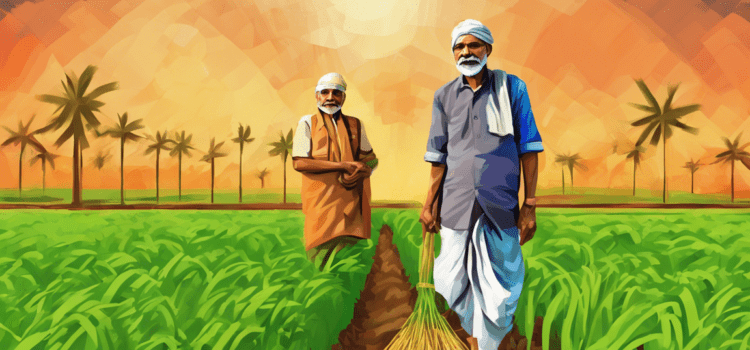The Pradhan Mantri Kisan Samman Nidhi (PM-Kisan) Scheme is a government initiative in India aimed at providing income support to small and marginal farmers. Under this scheme, eligible farmers receive direct income support of Rs. 6000 per year in three equal installments of Rs. 2000 each. To ensure that the benefits of the PM-Kisan Scheme reach the intended beneficiaries and to prevent fraud and duplication, the government has implemented a Know Your Customer (KYC) process.
What is KYC?
KYC is a process designed to verify the identity and address of customers or clients before they can avail of services. In the case of the PM-Kisan Scheme, KYC is essential to weed out ineligible beneficiaries and ensure that the financial assistance reaches genuine farmers.
Importance of KYC for PM-Kisan Scheme
Implementing a robust KYC process for the PM-Kisan Scheme is crucial for the following reasons:
-
Prevention of Fraud: KYC helps in verifying the identity of farmers and reduces the chances of fraudulent claims.
-
Targeted Delivery: By verifying the details of beneficiaries, KYC ensures that the financial aid reaches the right individuals, i.e., small and marginal farmers.
-
Data Accuracy: KYC helps in maintaining accurate and up-to-date records of beneficiaries, which is essential for the efficient disbursement of benefits.
KYC Process for PM-Kisan Scheme
The KYC process for the PM-Kisan Scheme involves the following steps:
-
Submission of Documents: Eligible farmers need to submit necessary documents such as Aadhaar card, land ownership papers, and bank account details to the concerned authorities.
-
Verification: The submitted documents are verified by the implementing agency to ensure their authenticity.
-
Approval: Once the documents are verified, the beneficiary’s details are approved, and they become eligible to receive the benefits under the PM-Kisan Scheme.
-
Periodic Review: Periodic reviews and updates of beneficiary details are conducted to weed out any discrepancies or ineligible recipients.
Documents Required for KYC
To complete the KYC process for the PM-Kisan Scheme, farmers need to submit the following documents:
-
Aadhaar Card: Aadhaar card is mandatory for identity verification.
-
Land Ownership Papers: Documents proving ownership or cultivation rights of agricultural land.
-
Bank Account Details: Farmers need to provide their bank account details for direct transfer of benefits.
-
Passport Size Photograph: Recent passport size photograph for beneficiary identification.
Common Challenges in KYC Process
While the KYC process is essential for the effective implementation of the PM-Kisan Scheme, it also comes with its set of challenges:
-
Lack of Awareness: Many farmers, especially in rural areas, may not be fully aware of the KYC requirements and procedures.
-
Document Verification: Verifying the authenticity of documents submitted by farmers can be a time-consuming process, leading to delays in benefit disbursement.
-
Data Accuracy: Maintaining accurate beneficiary data and ensuring regular updates can be challenging, particularly in remote areas.
Tips for a Smooth KYC Process
To streamline the KYC process for the PM-Kisan Scheme, here are some tips for farmers and implementing agencies:
-
Awareness Campaigns: Conducting awareness campaigns to educate farmers about the KYC process and the documents required can improve compliance.
-
Digital Solutions: Implementing digital platforms for document submission and verification can expedite the KYC process and reduce manual errors.
-
Timely Communication: Regular communication with beneficiaries regarding KYC updates and requirements can help in maintaining accurate records.
Frequently Asked Questions (FAQs)
- Who is eligible to apply for the PM-Kisan Scheme?
-
Small and marginal farmers owning cultivable land are eligible for the PM-Kisan Scheme.
-
Can a farmer update their KYC details for the PM-Kisan Scheme?
-
Yes, farmers can update their KYC details by contacting the concerned authorities and submitting the required documents.
-
What should I do if my KYC documents are rejected?
-
If your KYC documents are rejected, ensure that you have submitted all the required documents accurately. You can reapply with correct documents if needed.
-
How long does it take for KYC approval under the PM-Kisan Scheme?
-
The time taken for KYC approval may vary, but authorities strive to process applications in a timely manner.
-
What happens if a farmer misses the KYC deadline for the PM-Kisan Scheme?
-
Missing the KYC deadline may result in delayed or non-receipt of benefits. It is essential to adhere to the deadlines set by the authorities.
-
Can beneficiaries check the status of their KYC application online?
-
Yes, many states offer online portals where beneficiaries can check the status of their KYC application.
-
Is it mandatory to link Aadhaar with the PM-Kisan Scheme for KYC?
-
Yes, linking Aadhaar with the PM-Kisan Scheme is mandatory as it serves as a primary identification document.
-
Are tenant farmers eligible for the PM-Kisan Scheme?
-
Tenant farmers are not eligible for the PM-Kisan Scheme unless they have a recorded lease agreement or are recognized as cultivators by the state government.
-
What is the process for updating bank account details for PM-Kisan benefits?
-
Farmers can visit the nearest Common Service Centre (CSC) or contact the designated authorities to update their bank account details for PM-Kisan benefits.
-
Can farmers receive PM-Kisan benefits without completing the KYC process?
- No, completion of the KYC process is mandatory to receive the benefits under the PM-Kisan Scheme to ensure transparency and accountability.
In conclusion, a robust KYC process is essential for the successful implementation of government schemes like the PM-Kisan Scheme. By ensuring the authenticity of beneficiaries and maintaining accurate records, KYC plays a vital role in targeted delivery of benefits and preventing misuse of funds. Farmers should proactively comply with the KYC requirements to avail of the assistance provided under such welfare schemes.

